As players get older, the belief is that they learn the tricks of the trade and get better at defense. During their first few years, they’re ill-equipped and unable to have a positive impact on defense, despite their superior athleticism and energy.
Do the numbers support these beliefs? We must turn to the always-useful Basketball-Reference.com. Using its Player Season Finder, I put together a spreadsheet containing every season from every player (minimum 500 minutes played) for the past five years. Using this data, we can see how Defensive Ratings change as players get older. Defensive Rating was developed by Dean Oliver, and it estimates the number of points a player allows per 100 possessions. Obviously, a lower number is better. To read more about it, check out the Basketball-Reference glossary. Let’s take a look at the chart:
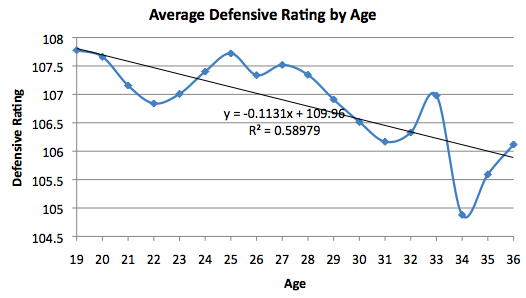
I limited the age range from 19 to 36 to avoid outliers. On the x-axis, we have the age, and on the y-axis, the average Defensive Rating for that age. The results seem to confirm the common belief. Younger players tend to post higher (worse) Defensive Ratings than older players. Real life doesn’t work perfectly, so there are some fluctuations. However, the correlation is strong, indicated by the relatively large R^2 (explanation here). Therefore, there does appear to be something to the notion that players get better defensively as they get older.
We can also produce a similar graph using Defensive Win Score, a similar measure to Defensive Rating (for more information, check the glossary again). Basically, DWS is the amount of wins a player adds to his team through his defense. The chart is below:
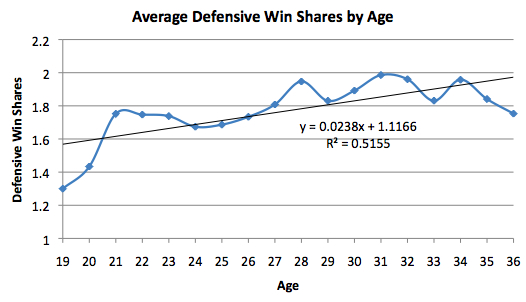
The R^2 is slightly smaller, but the general idea is the same. Players get better defensively as they get older. Not considerably so, but statistically significantly so.
However, we must approach these results with caution. Let’s say, hypothetically, that big men generally have lower Defensive Ratings. Let’s also say, hypothetically, that big men stay in the league longer than their shorter counterparts. These two scenarios would combine to make it look like players get better defensively with age. What’s a simple way to account for complications such as this? Take a look at the data position by position.
To start, let’s look at centers:
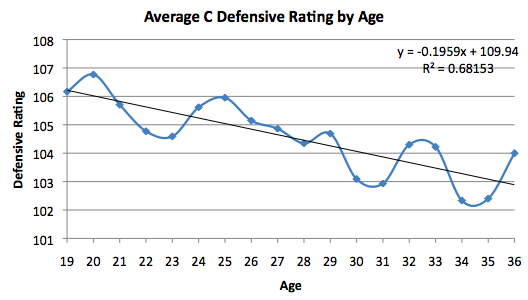
The results appear to be clear as day here. The line is a little wavy, but centers sure seem to get better defensively as they get older. The average for 35-year olds is over three points per 100 possessions lower than the averages for 19-, 20-, and 21-year olds. Do power forwards react the same way to age?
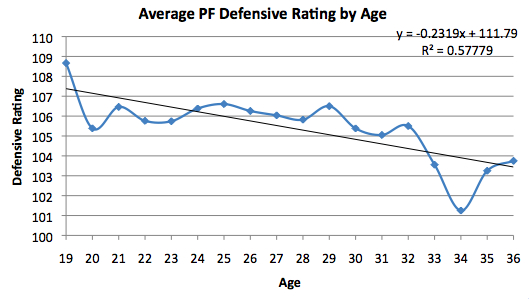
Simply put, yes. These results tend to go with common logic. Many raw and young big men commit silly fouls, ignore help defense, go for the spectacular block too often, etc. However, we should not treat these results as gospel, as I will explain later.
How about small forwards?
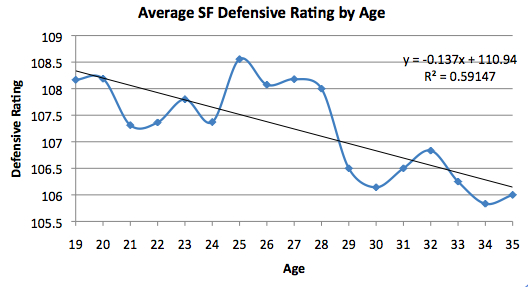
Just like the previous two positions, it appears small forwards age well, at least on the defensive end. The magic number for this position appears to be 29. Small forwards that were at least 29 years of age during the last five seasons performed much better on the defensive end than their younger counterparts did. Let’s take a look at shooting guards:
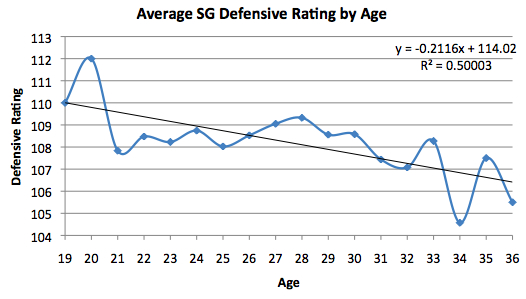
We keep seeing the same results. No matter what position you look at, the story is the same. Players get better on defense as they get older. Finally, let’s take a look at the inevitable and see how point guards get better defensively with age:
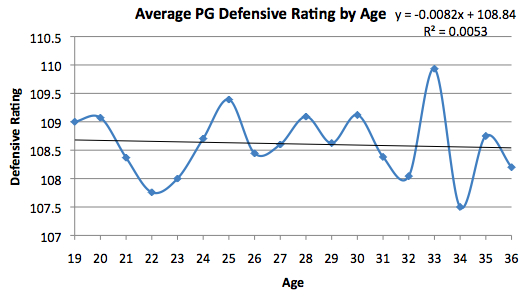
Woops. That trend line has an oh-so-slightly negative slope, but it’s not exactly a great fit for the data (the R^2 is practically 0). Clearly, then, point guards don’t follow the same path as other positions. Older is not better in this case. For a position that often relies so much on speed and quickness, this makes sense. However, even point guards in their prime (around the age of 27) don’t perform significantly better than the young ones.
To wrap this up, we can make the following statement based on the data: Except for point guards, players generally get better on the defensive end as they get older. However, there are a number of issues to address before we go too far and actually believe that bold statement I just made:
- The statistic I used, Defensive Rating, is far from perfect. Defense is one of the hardest things to measure accurately with statistics, and this measure is no different. It is highly team-dependent. Good defenders on poor defensive teams will be underrated, and vice versa.
- Although there is a correlation between age and Defensive Rating, that doesn’t mean it’s a causal relationship. It may not be that all older players are better defenders. Perhaps the only way to stay in the league if you’re getting older is to play solid defense, so the ones that don’t are selectively removed. Or maybe strong defensive teams like to acquire veterans, which boosts those player’s Defensive Ratings.
- Finally, although it is a pretty large sample-size (five years of data for 1,641 data points), the data still could be misleading. For example, if there happened to be a strong crop of old centers during the past five years, that position’s results may be inaccurate. I limited the sample to five years because I don’t like using data that is very old. The style of the NBA changes constantly, so using information from say, 10 years ago, may not be smart.
UPDATE: After doing some more research, we may have to re-think things. Thanks to suggestions by Ryan Parker and Mike G at the APBRmetrics board, I decided to plot the average change in Defensive Rating (the difference between the current year and the last) for each age. It is below:
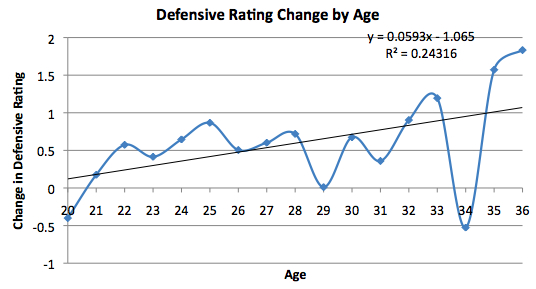
Looking at the graph above, we notice a couple of things. First, over the last five years, players of all ages tend to get worse defensively on a year-by-year basis. Whether it’s because of improving offenses or declining defenses, scoring has increased during each of the last five years.
More importantly for this study, we see that older players are declining faster than younger players are. For example, during the last five years, a 26 year-old is likely to have a Defensive Rating 0.5 points higher than he did a year ago. On the other hand, a 35 year-old is likely to have a Defensive Rating 1.5 points higher than he did a year ago. The difference between old and young isn’t much, but we can probably say that old isn’t definitively better than young.
Like I said in my original post, selective bias may be a problem. After all, this most recent research doesn’t dispute the fact that as a whole, when you look at all the old players, they tend to be better defensively than the young players. But that’s not because they got better as they got older. The data shows this. What we may be able to say now is that aging doesn’t improve your defensive abilities, and if you want to stay in this league as a veteran, you better be good at defense, because teams will “selectively remove” you from the league if you’re not.